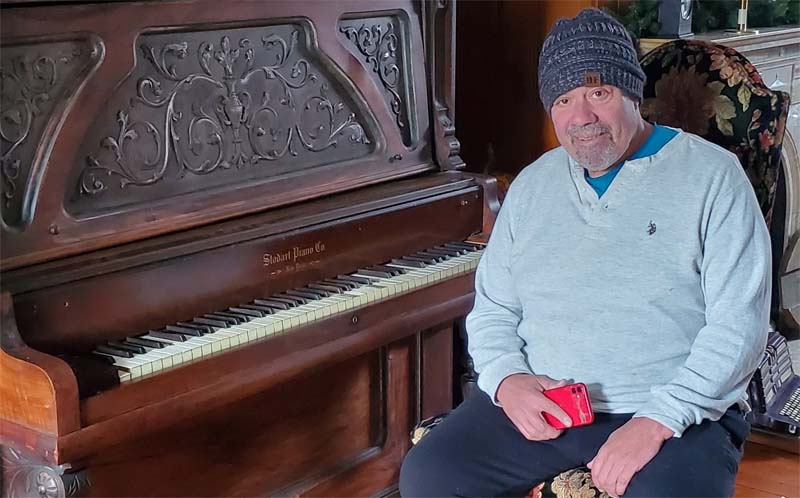

In the summer of 2018, he was diagnosed with lung cancer, which then spread to his brain. If that weren’t enough, he needed heart valve replacement surgery related to a heart murmur he’d been living with for years.
When Roy Meyers sets his mind to something, it’s as good as done. When he faced the perfect storm of a health crisis, his unshakable will—along with the latest treatment advances—saw him through.
But just as he’s shunned technology, the Army veteran’s mind and body continued to fight against disease. While he doesn’t use email, Google or social media, Roy has embraced the advanced Gamma Knife Icon brain tumor treatment available at JFK Medical Center.
Twists and Turns to Treatment
It was a lingering and nasty cough that led Roy to make an appointment that essentially saved his life. “Oddly enough, I was almost symptom-free [before I was diagnosed],” he says.
His treatment journey had many twists and turns. He planned to have surgery to remove the tumor from his lungs but was told he needed to first have his heart valve replaced. After he recovered from that procedure and attempted to reschedule his lung cancer surgery, three malignant brain tumors were detected in his brain.
Roy met with Joseph Landolfi, D.O., a neuro-oncologist at JFK and Jersey Shore University Medical Center, who said addressing the brain tumors was the top priority.
“The cancer really wasn’t interfering with my day-to-day-activity,” Roy says. “They caught it at an early stage and were able to treat it immediately.”
Treatment Reinvented
Roy was a candidate for Gamma Knife radiosurgery, a radiation therapy that doesn’t involve cutting into the brain, unlike traditional procedures that operate directly on the brain. Gamma Knife is used to treat tumors that traditional brain surgery can’t, it has fewer risks, and it’s non-invasive.
“Gamma Knife Icon is a newer procedure that uses a device that applies small beams of radiation on the tumors themselves,” says Dr. Landolfi. “While Gamma Knife has been around for decades, the Icon targets brain tumors more accurately, sparing surrounding tissue from additional radiation and extending to lower tumors in the upper cervical spine.”
Older Gamma Knife treatments used a frame device bolted and screwed into the patient’s head, which can create pain and discomfort. But with the evolution of technology and new therapies, Gamma Knife Icon allows for a frameless approach in which only a mask is fitted over the patient’s head and face. In Roy’s case, the frame approach was used for his first tumor, but Dr. Landolfi was able to use the frameless approach for the second two.
“Roy did well with the framed approach, but I didn’t want him to go through another placement,” Dr. Landolfi says. “It turns out, the frameless approach was much better and more comfortable for the other two tumors.”
Gamma Knife Icon treatment is an outpatient procedure that typically lasts a half-day. To no one’s surprise, Roy walked out of the hospital on his own power, straight to the parking lot. “My wife insisted on driving,” he jokes, “so I gave in. I let her do that.”
Staying Positive and Hanging Around
All of Roy’s tumors that were treated are stable or better, Dr. Landolfi says. His latest MRI shows a slight increase in one tumor that hasn’t been treated yet, and he is due for another MRI this year.
Dr. Landolfi notes that quality of life for patients depends on the location of tumors, which can cause neurological deficits. But Roy is plugging along. He hasn’t experienced any significant side effects from his treatment, though he has some challenging days where he feels a little discomfort and soreness in his body.
Regarding his lung cancer, a recent PET scan showed no spreading of tumors, and he continues to receive chemotherapy treatment.
“I’ve done my best to maintain a positive attitude,” Roy says. “I believe the doctors are doing everything they can. Besides, my wife says she wants me to hang around for a while.”
Next Steps & Resources:
- Learn how we work tirelessly to help patients with cancer live full lives.
- Meet our source: Joseph Landolfi, D.O.
- To make an appointment with Dr. Landolfi or another provider, call 800-822-8905 or visit our website
Find a doctor near me
A Young Mother’s Fight Against a Brain Tumor

Cancer Collaboration Brings Lifesaving John Theurer Cancer Center Clinical Trial to Washington, D.C., Native
The Beat Goes on After Brain Tumor
